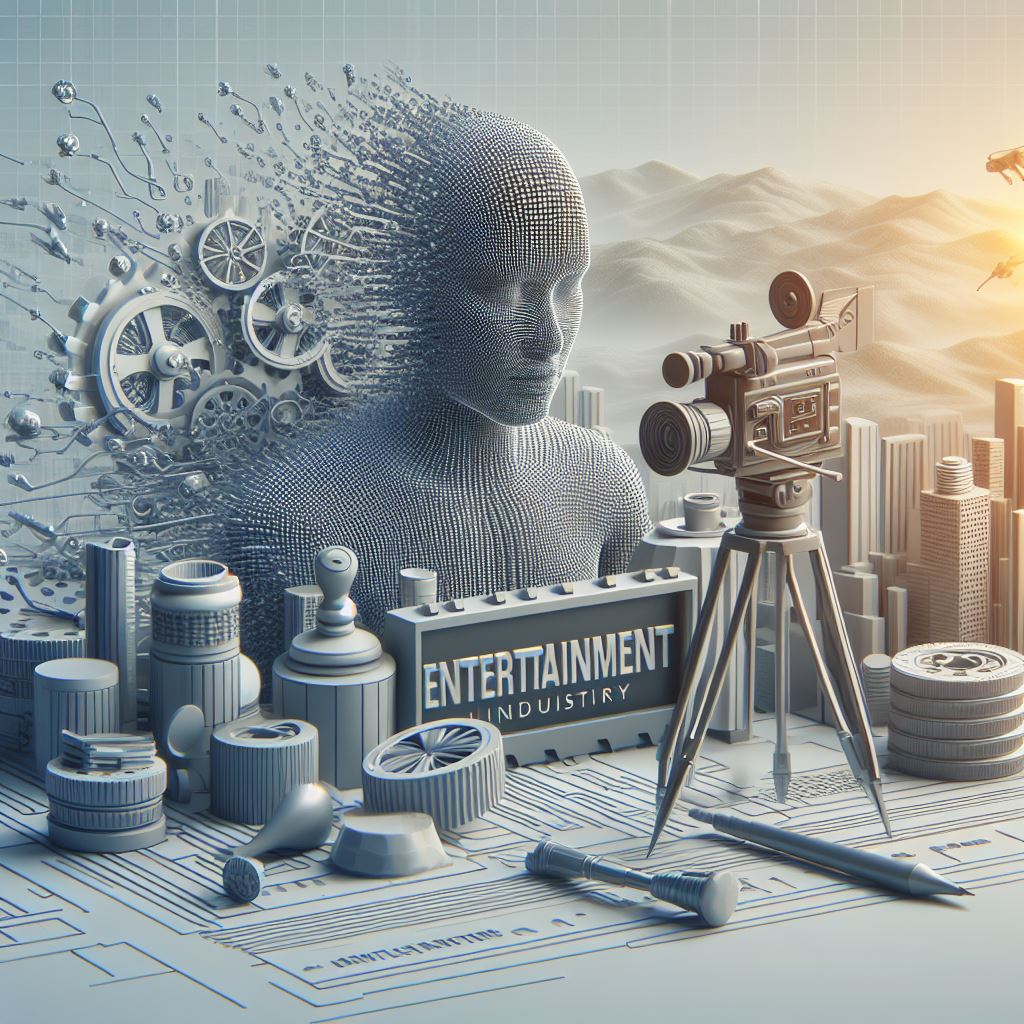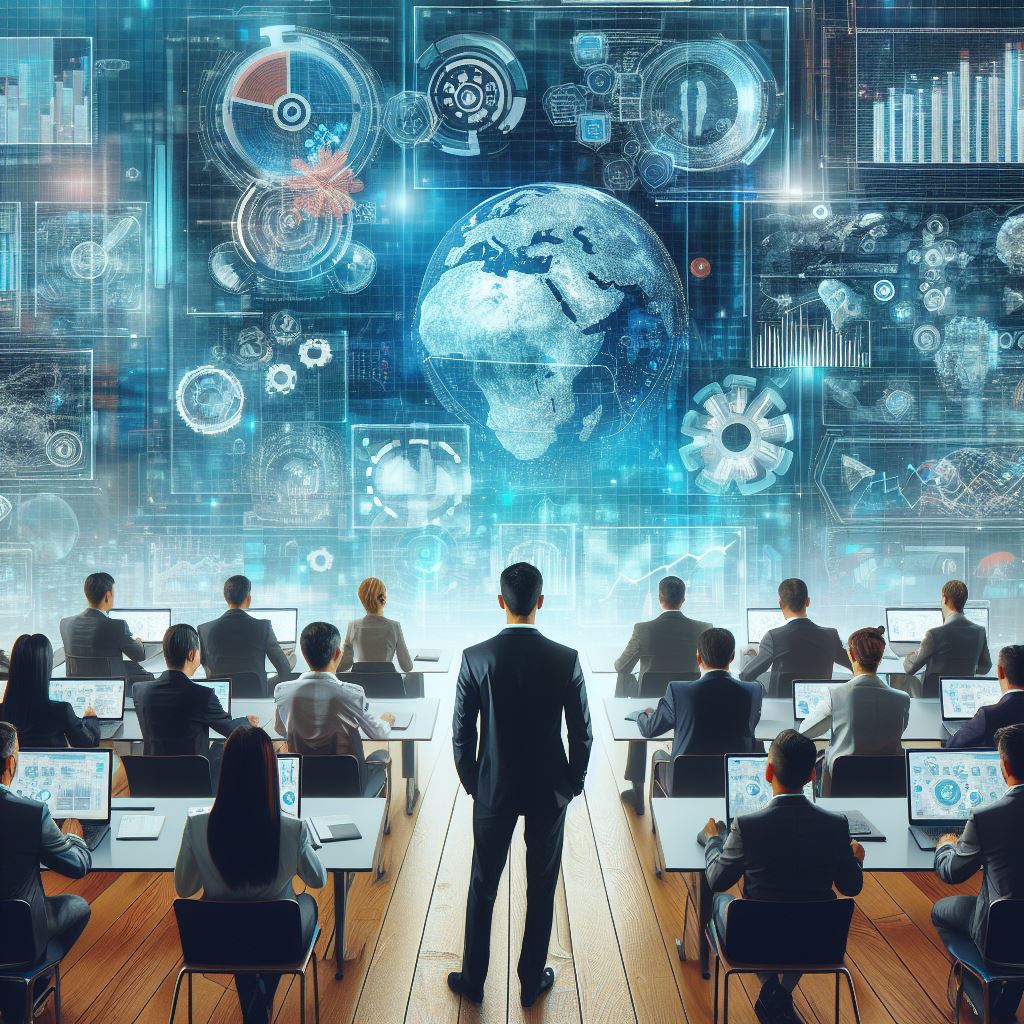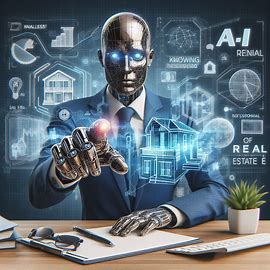Impact of AI Technology in Education Industry 2024
The Educational Impact of Ai Technology in Education Implementations Amidst the Recent Advancements Various learning approaches in the field of education have experienced great spectacular transformation of late through the integration of Artificial Intelligence (AI) techs.
Not only the revolutionary characteristic of this development but also the making of more personalized and effective educational experience is all reached by e-learning.
One among the major factors leading to AI tech playing a very strong role in education is because of the area smart technology which is in development of education systems.
Impact of Ai Technology in Education Industry
“Revolutionizing Education: The Impact of Ai Technology in Education Industry Implementations Amidst the Recent Advancements Various learning approaches in the field of education have experienced great spectacular transformation of late through the integration of Artificial Intelligence (AI) techs.
Not only the revolutionary characteristic of this development but also the making of more personalized and effective educational experience is all reached by e-learning. One among the major factors leading to Ai Technology in Education Industry playing a very strong role in education is because of the area smart technology which is in development of education systems.

Through the application of AI algorithms, educational platforms are capable of identifying the strengths and shortcomings of every student which allows their curriculum to be tuned to match each student’s individual requirements.
This individual approach showed to be the most productive in increasing motivation as well as academic success of the students.
However, Impact of Ai Technology in Education Industry , AI-based chatterbots are rapidly becoming important tools delivering fast and responsive support to students.
Such virtual assistants can give responses to the questions, give feedback and instruct students as they pursue their learning career.
AI chatbots appear as revolutionary in the method of online education because they work around the clock and widen the learning pool to include learners from different regions all over the world.
To continue, Ai Technology in Education Industry has equipped teachers with powerful tools, such as automatically grading of assignments and tracking of students’ progress.
Humanization involves carring out the process of automation thus freeing educators to concentrate on which teaching approaches and learning environment is more interesting.
Not with standing the many advantages of the Ai Technology in Education , some reservations over the ethical issues and the possibility of supplanting jobs have been raised. All the educational stakeholders should deal with these challenges in a proactive manner so that the emerging AI technologies remain ethical and responsible.
In conclusion, there is no other second just that, Impact of AI technology in Education Industry has indisputably influenced how educators and students interact and perform. From personalized learning triggered by AI to improved student engagement, AI might be the one to completely turn the world of education upside down and down.
Through the adoption of the Ai Technology in Education and concentrating on the creation of new opportunities, education can be developed to a more intelligent and modern approach.
The coming of AI technology into the software industry has certainly caused has made remarkable furore in different work spheres and education section among others not being left behind. While AI systems become more sophisticated through algorithm’s progression, the educational field transforms its operations and even changes the old-fashioned way how educators teach and students learn.
Schooling with Artificial Intelligence, has amplified learning and make it more efficient than before with cutting edge technology that is used to improve student engagement and performance.
Furthermore, the acts of virtual assistants running on the AI, namely chatbots, have also come into play as quite a thing empowering the students with immediate support and making online education more accessible, interactive, and seamless.
While this is not an unfamiliar scenario, questions also occur with considering any new technology in terms of ethics and jobs’ losses. Ai Technology in Education Industry has brought forth some major changes in how education is conducted and imparted. It has both positive and negative sides. In this article, our aim is to analyze the influence of AI technology in the education industry and shed light on the main perks and hurdles.
Introduction
In the past few years, the area of education has experienced a deep change by involving the AI. This unbelievable invention not only innovated the teaching methods but also dynamically changed the learning experiences of students. AI technology appears to be leading the education industry change towards personalized and effective learning methods that meet the diverse requirements of a student.
Adaptive learning is one of the core areas AI has greatly influenced. The use of AI algorithms by educational platforms makes it possible to analyze the strengths and weaknesses of each student for the development of a curriculum tailor-made to their precise needs. This student-centered plan has shown to be extremely efficient in increasing the engagement of the students and their academic performance, establishing the highest quality education.
AI-powered chatbots brought about a shift in the student support system as well. These virtual assistants promptly respond to questions, provide feedback and walk students through their learning process. With AI chatbots available all the time, online education has evolved a new path in which it is accessible and interesting for learners throughout the world.
Moreover, the AI technology has assisted educators in carrying out clerical activities like marking students’ assignments and keeping a tab on each student’s progress. Through automation of these processes, teachers will have the opportunity to explore creative teaching techniques, and they will be able to create a learning environment that fosters students’ development.
Although Impact of Ai Technology in Education Industry brings significant advantages, ethical issues and potential job displacement have been raised as well. Stakeholders in education must play a proactive role to overcome these challenges and guarantee that AI is ethically implemented to safeguard education.
Thus, Impact of Ai Technology in Education Industry will play a major role in the progress of education as evidenced in this paper. With personalized learning experiences to student engagement at higher level, AI is likely to bring about the revolution of education system.
Through their adoption and mastery of this transformative technology, the education sector can open up the road to a brighter and innovative future for learners and students worldwide.
1.Discuss the major impacts of Ai Technology in Education Industry
The transition of Artificial Intelligence into education has kindled a smart revolution that has seen the prevailing methods of teaching and learning crumble. The most impressive consequence of AI technology in education is the emergence of adaptive learning.
AI algorithms now allow educational platforms to analyze and understand the unique strengths and weaknesses of individual students, which they can then use to create a curriculum that directly responds to these particular learning needs.
This personalized approach has demonstrated a great success in increasing student involvement and scholarly achievement, consequently contributing to the improvement and effectiveness of the overall learning process.
In addition to that, AI-enabled chatbots are being viewed as a lifesaver in the process of giving students instant help. These virtual assistants are capable of addressing queries, providing feedback, and prompting students to successfully complete their studies.
Accessibility and interactiveness in online education have been enhanced by AI chatbots that allow them to have the 24/7 assistance that they need through the aid of chatbots. This high level of student-centered assistance guarantees that the learners get the much needed guidance and advice whenever they require, which is the key ingredient to the learning process.
Moreover, Ai Technology in Education has assisted teachers in automating their administrative tasks including assigning grades to the students and monitoring their progress.
Through the process of automation, educators can thus utilize the available time to develop personalized teaching methods and effectively create an incredible learning environment. Due to this efficiency the more individual attention educators can give, making learning more interactive and exciting.
Although the AI revolution in education will create numerous opportunities, the ethical dilemmas and automation risk are very valid concerns. It is crucial for the stakeholders in the education sector to face these issues positively and that the implementation of AI is done in a responsible and ethical way.
Ai Technology in Education Industry holds the power of yielding a revolutionary transformation towards education. However, correctly addressing these issues will be the main lever for the education world to bring glue through the smooth way using AI into the future teaching and learning process
2.Emphasize the personalized and more productive learning experiences that are often brought about by this integration.
The use of AI technology in the education sector has brought about a new era in the provision of personalized and effective learning experiences. Adaptive learning is one of the most well-known educational impacts of an AI.
AI algorithms examine the strengths and weaknesses of every student and customize the curriculum to cater to the specialized needs of each student. This personalized strategy not only increases student engagement but also helps in better learning by catering different needs of students.
Additionally, AI based chatbots have been vital in facilitating students’ immediate assistance. The work of these virtual assistants will include answering queries, providing feedback, and guiding the students through the educational experience at any time of the day. By providing individual help, AI chatbots have transformed online education into something that is more accessible and responsive for learners globally.
Moreover, AI has made it possible for teachers to automate tasks like grading of assignments and monitoring the progress of students. Automating teaching processes will give educators the extra time to work on innovative teaching strategies and creating a productive learning environment.[Ai Technology in Education Industry]
This efficacy enables educators to have a more personalized approach to teaching and learning, a factor that contributes to the improvement of their teaching methods as well as that of their students.
In conclusion, Ai Technology in Education has transformed education industry by offering customized student experience and boosting efficiency. Through the use of AI and utilizing its potentials the educational sphere is capable of bringing forth a brighter and more creatively designed future for the learners across the world.
The Transformative Power of AI in Education![Impact of AI Technology in Education Industry [2024] | Ai in education , Ai technology](https://digitalkar.com/wp-content/uploads/2024/02/OIG1.laEDTtpmYgNcu0bOZ.jpg)
Impact of AI in Adaptive Learning
The use of Ai Technology in Education sector has had a significant impact on adaptive learning, resulting in an evolution of student engagement with academic resources.
AI systems have the capacity to analyze individual students and recognize their strengths and weaknesses through which educational platforms can now design curricula that are fit for their needs. This personalized methodology has been proven to be very effective in improving students’ enthusiasm as well as performance.
Adaptive learning based on Ai Technology in Education is capable of providing a more efficient and productive educational journey through customized learning experiences for students .
These may include specially designed support materials that cater for different learning styles, or personalized tutors that adapt to changing abilities which promote mastery learning, improved results and deep understanding.
In addition; chatbots powered by AI have become valuable tools in offering immediate assistance to learners. These digital assistants are capable of answering queries, providing feedback, and guiding students through the learning process thus enhancing overall learning!!!
With all-time availability as well as easy interfacing features, these platforms have rebranded online education to suit users from every corner globally. In summary, the advent of Ai Technology in Education Industry into adaptive learning has boosted its
Explain how AI algorithms analyze individual student needs for tailored curriculum:
AI algorithms examine the individual needs of students to design bespoke curriculum. Education is being revolutionized by artificial intelligence (AI) algorithms and this happens through the provision of personalized learning experiences.
Hence, these algorithms target weaknesses and strengths of each student so that educational platforms can offer tailored curricula for their unique cases. The Ai Technology in Education could thus give insights on how every learner prefers to learn, the speed at which they do it as well as understanding levels.
AI algorithms that adapt to the individual requirements of students ensure that they receive specific help through targeted resources. This allows them to progress at their own pace, concentrating more on areas requiring improvements rather than following a general curriculum suitable for all.
As such, AI algorithms continuously track student performance and provide feedback that adjusts the path of learning accordingly. Such dynamic adaptation guarantees maintaining challenge levels appropriate for learners hence giving them guidance when faced with learning challenges.
Educators can take advantage of Ai Technology in Education ability to analyze what individuals’ needs are thereby making learning environments more fulfilling and productive for students. A customized syllabus also increases student involvement
How well is personalized learning work in improving student’s engagement and academic performance?![Impact of AI Technology in Education Industry [2024] | digital marketing agency , ai technology , impact of ai in education](https://digitalkar.com/wp-content/uploads/2024/02/OIG1-1.jpg)
Artificial intelligence-based personalized learning has disrupted the education sector by helping students become more involved in their studies and improve their overall performance.
Using AI algorithms, which take into account different strengths and weaknesses of a particular learner, e-learning systems can be customized to address such issues effectively.
Such specific approach not only allows for various learning styles but also promotes better comprehension and memory among students.
The effectiveness of personalized learning hinges on the creation of a dynamic, evolving curriculum that modifies itself based on student progress and performance at any given time.
Teachers can offer individualized content as well as necessary interventions to enable learners achieve better academic results. This form of tutoring encourages pupils to actively engage in their studies while empowering them to guide their educational journey themselves.
Furthermore, personalized learning enhances student engagement by making the learning experience more relevant and meaningful to individual students.
By incorporating their interests, learning preferences, and pace of learning, AI-powered adaptive learning platforms create a learning environment that resonates with students, promoting curiosity, exploration, and intrinsic motivation.
Moreover, unrelated to the previous sentence, by engaging students in the learning process and tailoring the content to their needs, educators can help create a more focused and productive learning environment.
Overall, personalized learning has proven to be a hugely effective strategy in enhancing student engagement and academic performance in the education industry.
By harnessing the capabilities of Ai Technology in Education Industry to tailor the learning experience to the individual needs of students, educators can create a more inclusive, engaging, and impactful educational environment that empowers students to reach their full potential. This is an important factor in student success and achievement.
Role of AI Chatbots in Education:
In education, AI chatbots have become invaluable tools transforming the manner in which learners interact with learning platforms. These digital companions provide immediate support, direction and feedback to students thereby ensuring continuous learning experiences.
By using Ai Technology in Education , chatbots can offer tailor-made assistance meeting the individual requirements of learners thus enhancing participation and comprehension.
The main advantage of AI chatbots is that they provide 24/7 support. Students are able to obtain assistance and information all the time making it a flexible and inclusive education system. The chatbot can answer questions, give explanations and help students through their educational journey making e-learning more interactive.
Furthermore, repetitive tasks such as answering basic student questions are also made simpler through artificial intelligence (AI) chatbots by reducing teacher workload. This way instructors have an opportunity to come up with creative teaching methods that promote an active learning environment.
Consequently, teachers will be free to give personalized assistance so as to improve the learning experience in general for students. Artificial Intelligence (AI) enabled chats bots when introduced into education not only enhance student-teacher interactions but also.
Study the advantage of chatbots powered by AI in giving students immediate help.
AI chatbots have become an integral part of the Education industry, providing instant support to learners in a vibrant and interactive way. They are changing the manner students seek counsel, find out information, and interact with educational resources.
By using Ai Technology in Education , these bots can offer timely guidance as well as responding to inquiries; they also provide feedback and direct users throughout their learning experience while maintaining personalized interactions.
This means that student support is available 24/7 through AI-powered chatbots regardless of time zones or geographical locations.
This makes learning more convenient and flexible for global students thus enhancing their overall learning experience. Students get aid on assignments promptly, clarifications on concepts, course materials among others thus creating a supportive and enabling learning environment.
Moreover, AI chatbots significantly contributes to increased efficiency and productivity within educational institutions by automatized routine tasks and administrative processes.
Educators can focus their time and energy on designing engaging lessons, mentoring students, and fostering creativity, rather than getting bogged down by the repetitive tasks like grading assignments or responding to basic queries.
Overall, the benefits of AI chatbots in offering immediate, real support to students are manifold. They enhance accessibility, provide personalized assistance, streamline commutation, and contribute to a more interactive and engaging learning experience.
As technology continues to advance, AI chatbots will play an increasingly paramount role in shaping the future of education, empowering students and educators alike to achieve their fullest potential.
![Impact of AI Technology in Education Industry [2024]](https://digitalkar.com/wp-content/uploads/2024/02/OIG1._6FWBWrSx9yh.jpg)
Emphasize the significance of proactively addressing these challenges so that AI could be implemented in a responsible and ethical way.
It is important to address these issues by taking action in advance, making sure that artificial intelligence (AI) does not pose any challenge related to responsibility and ethics. Stakeholders must emphasize on ethical aspects while adopting AI given its disruptive nature within the sector.
Some major concerns about educational AI technologies relate to data privacy and security. This requires developing stringent measures for protecting sensitive information gathered from students by AI systems as well as ensuring compliance with data protection legislations.
Furthermore, educators and policy makers should set out specific rules concerning data handling, storage, retention periods as well as sharing facilities thus safeguarding student’s private lives and keeping public confidence on education system.
Furthermore, it is also a valid concern that needs to be addressed regarding potential job displacement resulting from automation of certain tasks through use AI technology.
Although administrative processes could be streamlined using AI thereby improving efficiency; it is necessary to consider its effects on the workforce while prioritizing re-skilling and upskilling of teachers who need to adapt the dynamic environment.On another note, loss of jobs due to automation using artificial intelligence poses a significant worry that needs to be dealt with.
Artificial intelligence can make administrative processes more streamlined and efficient, but it is crucially important to look at the macro level implications on employment and prioritize strategies for upskilling and reskilling teachers to meet these changes.
By investing in training programs and professional development opportunities, stakeholders can enable teachers to effectively use AI technology and move into roles that rely on human abilities such as creativity.
In addition, moral usage of AI technologies for education involves transparency, accountability, and inclusiveness. In order to ensure fairness, equity and diversity are promoted through designing or implementation of AI systems; it is imperative that developers collaborate closely with educators.
To uphold ethical principles and values while unlocking the full potential of artificial intelligence stakeholders must combat algorithmic bias by prioritizing diversity in data sets and creating inclusive learning environments.
In conclusion, the responsible and ethical implementation of AI technology in education is paramount to maximizing its benefits and minimizing potential risks.
By proactively addressing challenges, fostering collaboration, and prioritizing ethical considerations, stakeholders can harness the transformative power of AI to create a more innovative, inclusive, and sustainable education system for the future.
Conclusion:
In summary the introduction of Ai Technology in Education has significantly transformed the field of education. The influence of AI, on education is profound leading to an era characterized by learning opportunities increased student engagement and more efficient administrative processes.
Through the utilization of AI algorithms for learning educational platforms can customize their curriculum to cater to the needs of each student ultimately enhancing academic performance and facilitating a smoother learning experience.
Furthermore AI powered chatbots have enhanced the journey by offering assistance to students providing support round the clock and making online education more accessible and engaging on a global scale.
Moreover the automation of tasks using AI technology has allowed educators to concentrate on developing teaching methods and fostering dynamic learning environments.
Although the advantages of AI in education are extensive it is crucial for stakeholders to address concerns and potential job displacement issues.
By tackling these challenges and ensuring integration of AI technology in education sector can harness AIs full potential to create a brighter and more innovative future for learners worldwide. Embracing this transformative technology sets the stage for a revolutionized approach, to teaching and learning that will shape the future of education in ways.
Summarize the undeniable impact of AI technology in education industry.
Artificial Intelligence (AI) technology has undeniably revolutionized the education industry, offering a transformative approach to teaching and learning. Through adaptive learning, AI algorithms analyze individual student strengths and weaknesses, providing tailored curricula that enhance engagement and academic performance.
AI-powered chatbots offer immediate support, making education more interactive and accessible globally. Moreover, educators benefit from streamlined administrative tasks, allowing for more time to innovate and create dynamic learning environments.
While concerns exist around ethics and job displacement, stakeholders must address these issues proactively. Embracing AI’s potential, the education industry can lead the way towards a brighter and more innovative future.
Emphasize the importance of AI as a tool to completely change education so that it is brighter and more creative than ever before :
Ai Technology in Education has great potential to disrupt teaching and learning methods leading to a brighter, more innovative future in education. The advent of Ai Technology in Education has brought about personalized learning experiences where curriculum is designed for individual needs and learning styles of students.
With adaptive learning enabled by AI algorithms, educational platforms can identify strengths and weaknesses in students hence giving specific support that enhances student participation and academic performance [Ai Technology in Education]
AI-powered chatbots have emerged as invaluable assets in providing immediate assistance to students, offering round-the-clock support, answering questions, guiding learners through their educational journey. This interactive approach has transformed online education making it accessible and enthralling for students all over the globe.
Moreover, educators have been able to use Ai Technology in Education to automate administrative tasks freeing them up to concentrate on developing cutting edge teaching strategies and creating dynamic learning environments.
Though Ai Technology in Education Industry does have huge advantages, it is crucial for the stakeholders to be proactive about ethical issues and job loss. The industry of education can shape a future that is more inclusive and innovative by using AI technology responsibly and with ethics.
Through adopting Ai Technology in Education into teaching methods, it enhances not only how students learn but also allows unlimited possibilities to improve the quality of education and prepare learners for an ever-changing digital era.
To sum up, the integration of Ai Technology in Education Industry has brought about a new wave of innovation and effectiveness.
Adaptive learning and AI-powered chatbots are among the many areas where AI has significantly impacted on education by providing personalized student experiences while enabling educators perform administrative duties effectively.
However, there have been some concerns about its ethical implications as well as possible job displacement; hence, it must be implemented responsibly using certain preventive measures in the context of educational institutions embracing this transformativeAi Technology in Education leading to infinite possibilities in terms of changing both teaching and learning approaches thereby creating a brighter more innovative future for education.




